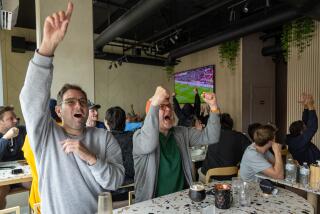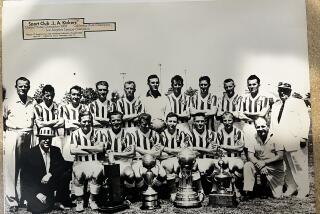A Cupful of Hopes : Immigrants Dream of Glory for Teams From Homelands as They Await Start of Soccer Matches
- Share via
In eager anticipation, Julio Cesar Pineros dons the appropriate garb: his body draped in the tricolor of his Colombian homeland, his head crowned in a curly blond wig fashioned after the flowing coiffeur of Carlos Valderrama, the living soccer legend known affectionately as El Pibe.
“We are ready,” says the confident Pineros, standing among excited fans at a Colombian restaurant in Van Nuys, its walls adorned with posters of Valderrama and other stars. “Everyone will now see the greatness of Colombian football.”
While most people go about their business this week, Pineros and millions of other aficionados in Southern California and elsewhere in the United States have succumbed to a peculiar fanaticism that afflicts much of the world every four years.
The World Cup opens in nine venues throughout the United States beginning Friday, from Pasadena to Boston, Palo Alto to Orlando. And, despite general apathy among native-born Americans, the spectacle’s arrival is dazzling immigrant communities nationwide.
Patriotic fans fervently discuss the fortunes of their home teams and rivals, haggle about ticket prices, and clear their schedule for a month of what will be, for many, near-total immersion. Along with Mexican taquerias and Salvadoran pupuserias, boosters will assemble in Irish pubs, German beer halls, Italian cafes, Greek diners and Spanish tapas bars, not to mention homes, offices and other locales.
Some will pay particular attention to the four foreign teams training in the region: Colombia at Cal State Fullerton, Romania at UC Irvine, Sweden at Loyola Marymount and Cameroon in Oxnard. The U.S. national team is based in Mission Viejo.
“Everyone’s talking about la copa ,” says Nelson Canales, a Salvadoran hotel worker who was among the throngs of young men kicking a mottled ball around Elysian Park this week.
South Korean and Bolivian expatriates have become animated by the rare Cup appearances of their teams. “We don’t expect them to win, but we hope our players offer a good game,” said Yery Camacho, a Bolivian sports enthusiast in Orange County.
*
Soccer has long failed to enthuse most Americans, but in the Los Angeles area, with its swelling immigrant population, it is the chosen sport of millions--mostly Latino newcomers, but also including Asians, Europeans and Africans who participate in hundreds of area club teams that are multinational in character.
In recent weeks, Cup excitement has swelled in the organized fields and pickup spots in which devotees congregate to play the world’s most popular sport.
“For us Latinos, this is like a carnival,” said Jose Rivera, a Honduran warehouse worker. He stretched out on the grass before embarking on a game of pickup soccer in Elysian Park, where two garbage cans are the standard goal posts. “Football seems to be in our blood.”
Many fans now regret not having invested in tickets weeks ago, when the passes were available--and cheaper. But Rivera is set. He and two friends paid $200 for tickets to the Colombia-Romania match on Saturday afternoon at the Rose Bowl.
With no Central American team in the picture, the warehouse worker is rooting for Colombia, a team whose flashy, attacking style--sparked by Valderrama--seems to have captured the imagination of many.
On Tuesday, dozens of Colombians, some carrying national flags and others wearing the signature blond wigs, descended on Los Angeles International Airport in hopes of greeting the arriving national team.
Many traveled via caravan from the Cali Viejo restaurant in the San Fernando Valley. Some arrived in a hand-painted bus, known as a chiva, similar to those that make the rural rounds of the South American nation.
“I wanted to show our support,” said Jorge Villas, who arrived at the airport in anticipation of seeing the Colombian team. But he and other fans were disappointed when security-conscious authorities whisked the players away from public view.
With many experts calling the Colombian squad a dark horse to win it all, national passions have climbed. Some among the 50,000-strong Colombian population in Southern California see an opportunity for a kind of national redemption.
“Maybe this will help change Colombia’s image,” said Ariel Garcia, a mechanic from Cali who voiced a common sentiment. “In this country, Colombia is always connected to drugs and violence. But Colombia has the best coffee in the world. We have some of the best cyclists. And now we have the best football in South America!”
*
In Griffith Park, where some of the area’s top soccer fields are concentrated, the World Cup buzz has been palpable. Vendors hawk caps and T-shirts emblazoned with the colors of dozens of nations. The uninformed seek out cognoscenti for leads on ever-scarcer tickets.
“The hopes of all we Mexicans here are with our national team,” says Rafaele Gonzalez, a 32-year-old gas station worker from San Luis Potosi who was working as referee in a game between a mostly Latino team and an opponent composed largely of Greeks. “We want to win the Cup, but to advance to the second round would be a triumph.”
That Mexico is playing its first-round contests on the East Coast--far from its compatriots in California--has not dimmed enthusiasm, especially since fans were denied an opportunity four years ago. Mexico was banned from participating in the last World Cup for using over-aged players in an earlier youth tournament.
“The community had the spirit of the World Cup,” said Armando Garcia Luna, a Mexican consul general official who helped organize the event.
Univision, the Spanish-language network, plans to broadcast all 52 matches. ESPN and ABC will cover featured games. Fans will gather to watch in places like Tacos Toby, a Pacoima eatery that will be raffling T-shirts and game tickets to crowds gathered in front of its two big-screen television sets.
“We’re expecting a lot of people,” co-owner Rodrigo Corona said.






